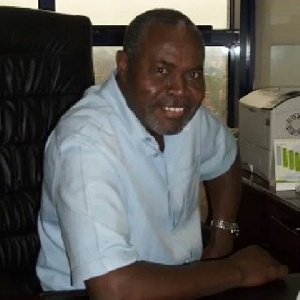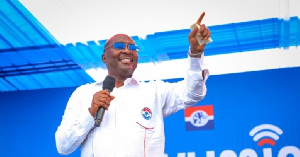Zaya Yeebo Writes.. In 1982, Ghana shocked the football world, when the Black Stars won the African Football Confederation Cup. We had no resources, no training and no hope, here’s how we triumphed. Over 30 years later, we have lots of money, international superstars and a world-class coach, and yet we’ve failed. Zaya Yeebo tells the story of Ghana’s last victory, and how it changed the nation.
In 1982, I was in a hotel lobby in the Libyan capital Tripoli when I was approached by a white man I later learned was the coach for Cameroon. I was Africa Cup of Nations tournament in my capacity as Minister for Youth and Sport.
The Cameroonian coach asked me a question thought was weird, partly because I had not thought about it: “Who selects the players for the Black Stars?” Without hesitation, I said “The Coach and team management.” That year, Cameroon was tipped to win the cup. But once they got to Tripoli, they faulted and were struggling in the tournament. The coach told me his team had suffered from politics. He was ordered to to consider the “tribal balance” of his team. That, he said had made it difficult for him to select the players he wanted.
December 31, 1981 coup d’état This was right after Jerry Rawlings staged the December 31, 1981 coup d’état. Out new military leader’s first pronouncement was that Ghana would not miss the 1982 AFCON tournament. To a lot of people, it sounded like a waste of time. There had just been a revolution. Ghana was still reeling. We had no money. But tor the PNDC, it was a political decision of enormous proportions. It was about the kind of country Ghana should be. It was about African solidarity.
This was serious. The games were taking place in Libya, and at the time, the country’s leader Muammar Gadhafi was locked in conflict with the United States. So the United States and other western nations tried to sabotage AFCON. Gadhafi needed the tournament to take place, so he sent a high-powered delegation to Accra. I met with the Libyan delegation and promised Ghana would be there.
The bombshells started dropping Then the bombshells started dropping. The National Sports Council said we had no money. And that the government of former leader Hilla Limann had promised to side with the US and not attend the tournament, so the Black Stars had not trained. The most devastating blow came when I went to the storerooms of the National Sports Council. They had been looted. It was as bare as the Sahara desert. There was no sports equipment, no uniforms, no boots, not even a single football.
I met the Libyan Ambassador in Accra told him the truth: we couldn’t even afford to go to Kumasi, let alone Tripoli. The Ambassador promised he’d help us find a place to stay in Libya, and provide a bus for the team to get around. Rawlings let us use the presidential jet
As soon as I had fixed that problem, another emerged. We had no manager. The Ghana Football Association was caught in standoff with the Sports Writers Association, who were very active at the time had accused the Association of corruption. I held a meeting the sports writers.
They presented me with a compromise: sack the corrupt staff of the Ghana Football Association, and they’d be back on board. It was an easy decision. I immediately reconstituted the GFA, making the late Zac Bentum the new chair. We finally had a road to Tripoli. We all pulled together. Rawlings let us use the presidential jet to fly to Libya and get back home. Zac Bentum provided the aviation fuel. Sports writers agreed to accompany the team without being paid their usual allowance.
We all have to make sacrifices In Tripoli, the young men on the team started to get nervous. They didn’t want to make fools of themselves, or of Ghana. So they started to make demands they knew I couldn’t meet. It wasn’t as bad as demanding I fly millions of dollars to Brazil. They wanted simpler things: cars, an allowance, and they wanted me to guarantee they’d be paid. I knew I couldn’t ask the Ministry of Finance for this. We were struggling back in Accra. So instead, I built personal relationships with the team, including the now legendary Abedi Pele. He started calling me ‘Afro Moses’ because I always wore sandals (I still do.) Pele was a teenager at the time, the tournament would be his big break.

I told the team the truth: we all have to make sacrifices. Ghana was in a tough spot. We had no money for cars. We had no money for allowances. I wasn’t being given a penny, neither were any of the officials at the tournament, including coach Charles Gyamfi. Something had to be done

Even though I had calmed the team down, I knew there was still some resentment in the ranks. That couldn’t stand. We needed the players to focus on the tournament, and not worry about what they were going to eat when they got back to Ghana. Something had to be done. I went back home to Ghana, and met with newly reformed Ghana Football Association, and to the man who would become President John Atta Mills, who I had appointed as chair of the board of the National Sports Council.
The only way to raise money, we concluded was to stage football matches all over Ghana, and charge a small entrance fee. The money we raised could be used to support the players. It worked. They raised enough money to pay the players after the tournament.
Nobody expected the team to get past the quarter finals, but as the tournament progressed, it became clear the Black Stars had not gone to Libya to lose. The nation sat up, and put its support behind the Black Stars. I later learned that before Ghana had to face Libya in the finals, someone started spreading rumours around Accra that someone named Zaya Yeebo “had sold the match to the Libyans.” I had not. But that didn’t matter. They assumed I was in Libya, and they were getting ready to lynch me when we touched down at Kotoka Airport. In fact I was at home in Ghana. Luckily for me, the Black Stars were in fine form for the match. I watched from Accra as Ghana became the first country in the history of the tournament to win on penalties. At 120 minutes, the teams were drawn 1-1, so the result would be down to a penalty shootout.
Players Sampson Lamptey, George Alhassan, Isaac Paha, Windsor Kofi Abbrey and Albert Asaase scored in the first round of the shootout. In the second round Owusu Mensah saw his penalty saved by the Libyan side. The teams were drawn again. Then Owusu Mensah saved seventh kick from the Libyans, helping Ghana win AFCON for the forth time.
The AFCON victory came at a time when the PNDC regime was facing severe problems, and needed a diversion. It gave Ghanaians a reason to be cheerful and united. For two months, Ghanaians could forget their economic hardship and talk football.
It showed that above everything else, football can unite people. It also showed it is possible to fund national sports without spending government money that is desperately needed elsewhere. As we lick our wounds and fret over the Black Stars failing to bring the cup home yet again, it’s clear the nation needs to band together once again to make the impossible happen. We will need to make sacrifices again. And the sacrifices need to start at the very top of football administration.
Sports News of Monday, 13 February 2017
Source: goldcoastjournal.com
Former Sports Minister makes interesting revelations about how Ghana won 1982 AFCON
Entertainment
















